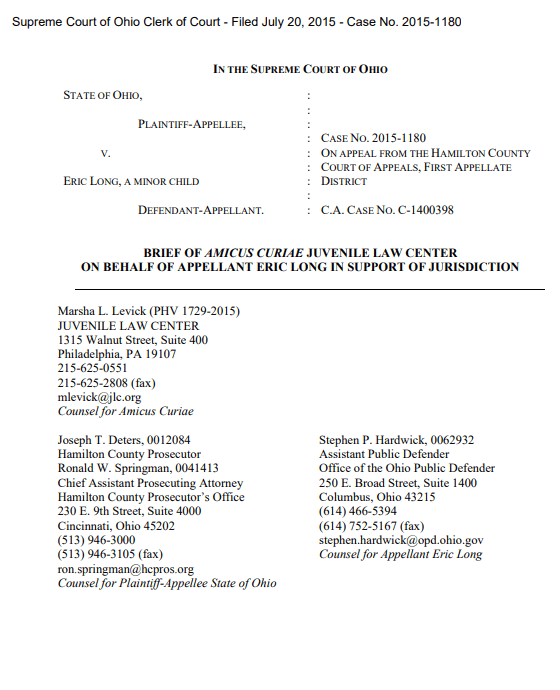
Summary of Argument
In 2010, the United States Supreme Court held that life without parole sentences for juveniles convicted of nonhomicide offenses are unconstitutional, finding that “defendants who do not kill, intend to kill, or foresee that life will be taken are categorically less deserving of the most serious forms of punishment.” Graham v. Florida, 560 U.S. 48, 69 (2010). Two years later, the Court held in Miller v. Alabama, 132 S. Ct. 2455, 2469 (2012), that mandatory life without parole sentences were unconstitutional for juvenile homicide offenders.
In 2009, Appellant Eric Long was convicted of two counts of aggravated murder for a crime that occurred when he was 17. State v. Long, 8 N.E.3d 890, 892 (Ohio 2014). He received two consecutive discretionary life without parole sentences. Id. After the U.S. Supreme Court ruled in Miller, this Court vacated Eric’s sentence and held that “the trial court must consider Long's youth as mitigating before determining whether aggravating factors outweigh it.” Id. at 899. This Court further noted that “because of the severity of [life without parole], and because youth and its attendant circumstances are strong mitigating factors, [life without parole] should rarely be imposed on juveniles.” Id. At his resentencing hearing, however, the trial court resentenced Eric to life without parole.
This Court should take jurisdiction of Eric’s appeal to consider important questions ofconstitutional law that are of public interest. Specifically, this Court should clarify that Millerestablishes a presumption against imposing juvenile life without parole; this Court shouldestablish clear guidelines to ensure juvenile life without parole is not imposed arbitrarily andcapriciously; and this Court should hold that juvenile life without parole cannot be imposedwhen a juvenile is convicted based on a finding of “complicity.”